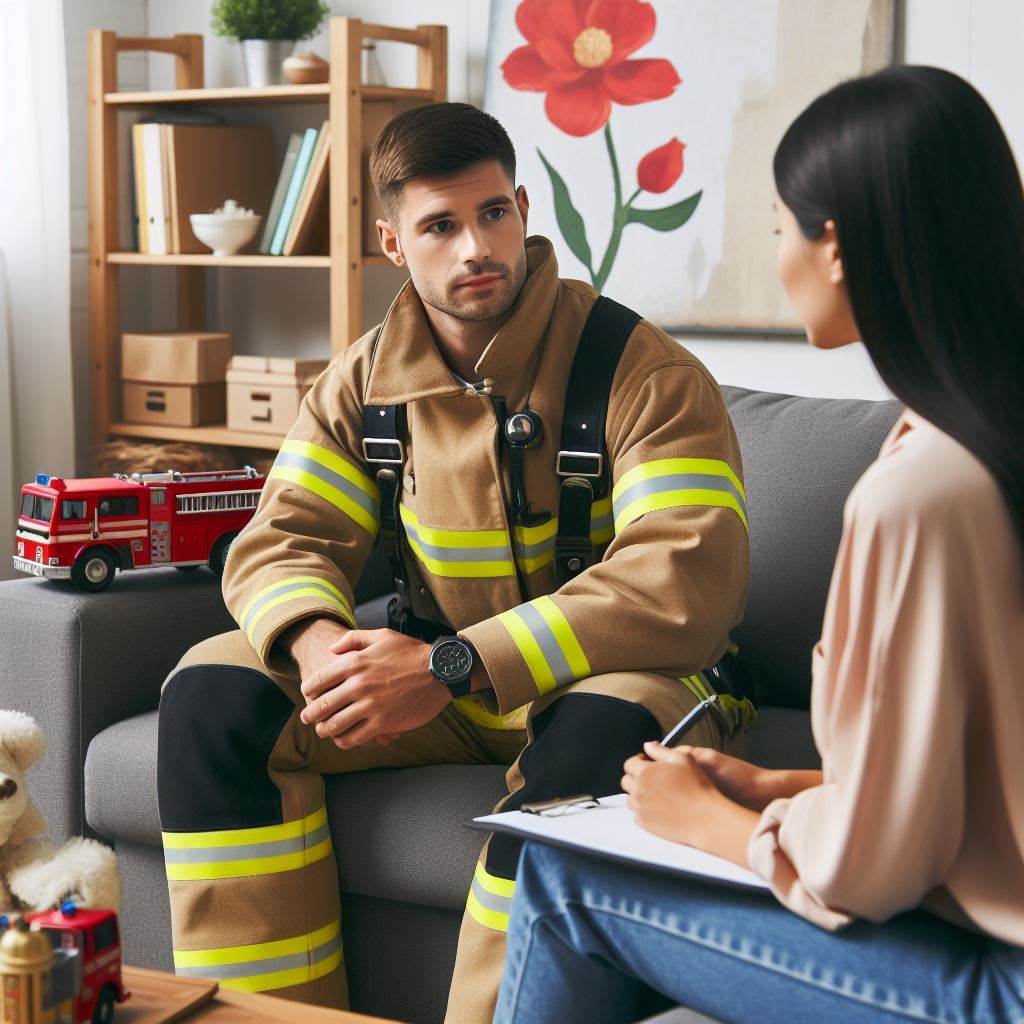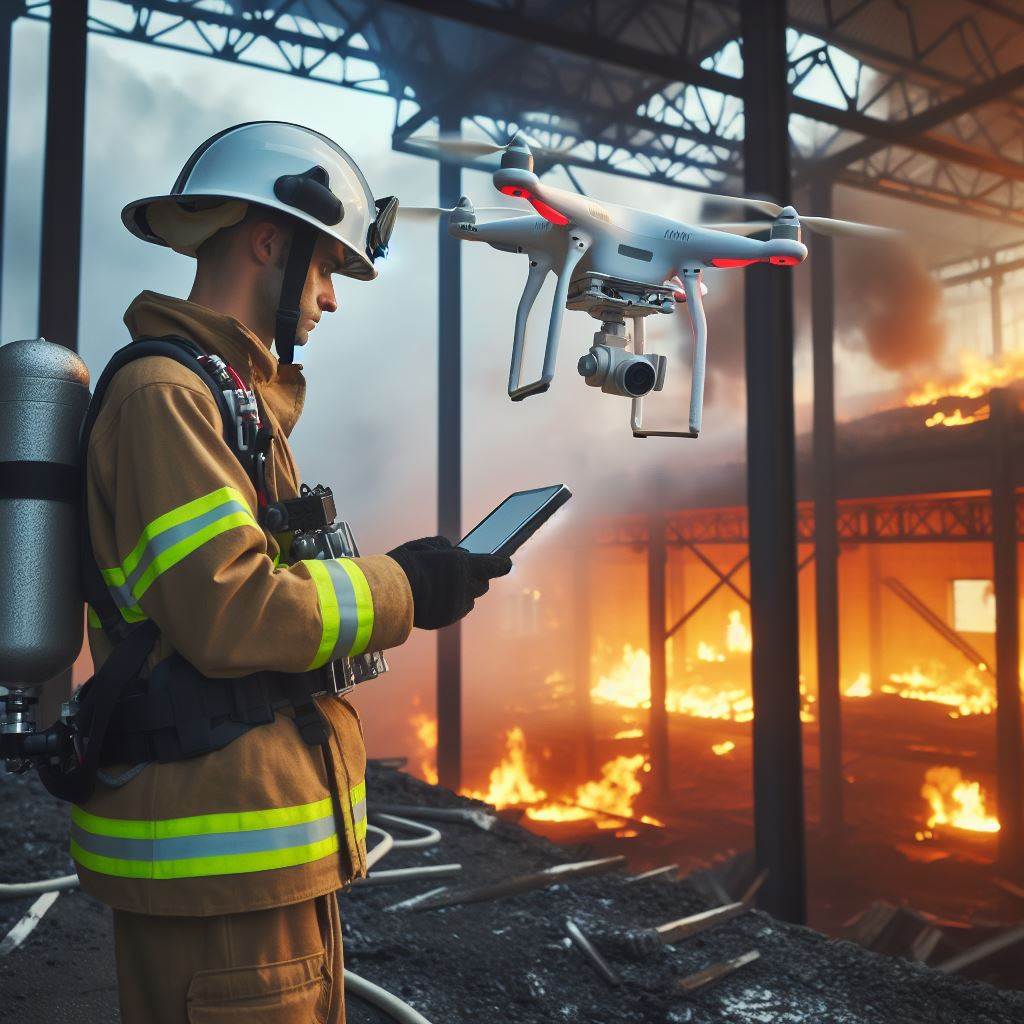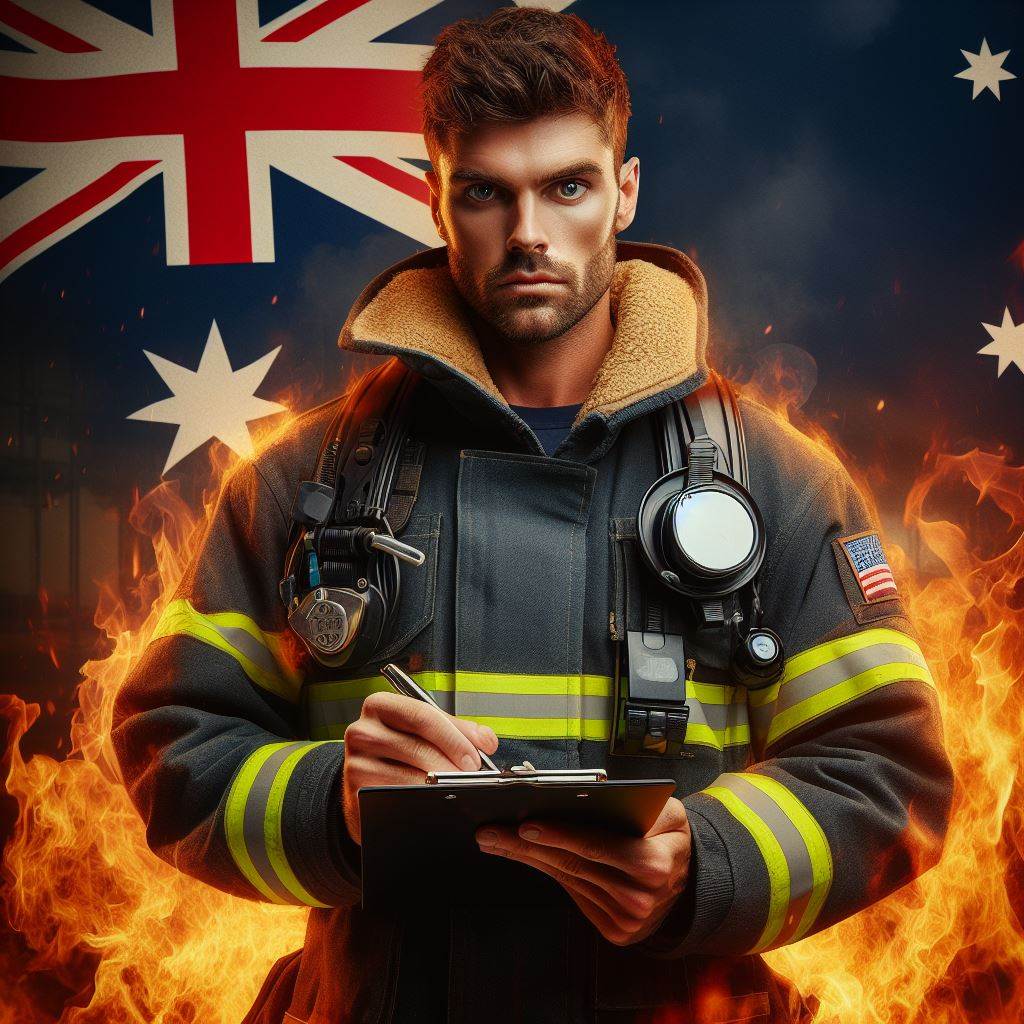Introduction
In the tapestry of emergency response, firefighters emerge as the valiant guardians, standing between communities and the relentless forces of disaster.
Beyond the awe-inspiring imagery of firefighters courageously facing roaring flames, their daily reality unfolds against a backdrop of unpredictability and trauma.
The nature of their work exposes them to a spectrum of distressing incidents—scenes of devastation, rescues amidst chaos, and navigating hazardous environments—all integral components of their duty.
While their physical prowess is evident, what often remains hidden is the silent battle that transpires within their minds—a battle against the subtle yet profound adversary known as Post-Traumatic Stress Disorder (PTSD).
Within the echoes of sirens and amidst the dissipating smoke, a quieter struggle persists. Firefighters, despite their resilience, face the haunting aftermath of their heroic service. PTSD, a mental and emotional toll, manifests silently, affecting their well-being in ways unseen by the external eye.
This section embarks on an exploration into the depths of this silent battle, seeking to illuminate the shadows surrounding the emotional landscape of those who valiantly bear the weight of their profession.
As we unravel the layers of their experiences, the goal is to foster understanding, empathy, and unequivocal support for the courageous individuals who navigate not only the external challenges of firefighting but also the internal complexities of their own mental health.
Understanding PTSD
Definition of PTSD and its symptoms
PTSD is a complex disorder that can severely impact the lives of firefighters. Understanding its definition and symptoms helps identify and provide appropriate support for those affected.
Post-Traumatic Stress Disorder (PTSD) is a mental health condition that develops in individuals who have experienced or witnessed traumatic events. These events, such as accidents, natural disasters, or violent attacks, overwhelm the person’s ability to cope, leaving them with long-lasting psychological effects.
The symptoms of PTSD can be debilitating and affect various aspects of a firefighter’s life. Flashbacks and nightmares transport them back to the traumatic event, causing intense fear, uncontrollable thoughts and anxiety.
These intrusive memories are distressing and make it challenging to concentrate on daily tasks.
PTSD also manifests as emotional numbness, where firefighters may struggle to experience positive emotions or show affection towards loved ones. Insomnia and hypervigilance become constant companions, as they are always alert for potential threats in their surroundings.
Impact of traumatic events on mental health
- Traumatic events cause extreme stress, overwhelming the individual’s ability to cope.
- Firefighters frequently encounter life-threatening situations, witnessing death and destruction.
- Repeated exposure to traumatic incidents increases the risk of developing PTSD.
The impact of traumatic events on a firefighter’s mental health is significant. Repeated exposure to life-threatening situations, witnessing human suffering, and dealing with loss can lead to the development of PTSD.
The collective toll of these experiences often goes unnoticed, leaving firefighters to battle their inner demons silently.
How PTSD affects daily life and relationships
The effects of PTSD extend beyond an individual’s mental health; they also affect their relationships and daily life, making it difficult to concentrate, work, or enjoy activities. Survivors of traumatic events may become isolated and socially withdrawn, avoiding situations that remind them of their trauma.
This detachment can strain relationships with spouses, family, and friends, who may struggle to understand the behavior changes.
PTSD can also give rise to anger and irritability. Firefighters may experience frequent mood swings or sudden outbursts of anger, causing further strain in their interactions. The challenges of living with PTSD make maintaining healthy relationships incredibly difficult.
Understanding how PTSD affects firefighters is crucial to provide appropriate support. Acknowledging the impact of traumatic events and recognizing the symptoms allows for early detection and intervention.
Mental health resources, counseling, and peer support can play a vital role in helping firefighters navigate the silent battle with PTSD and reclaim their lives.
Read: Diplomatic Immunity: The Basics
The Prevalence of PTSD among Firefighters
Firefighters are often hailed as heroes for their bravery and selflessness in protecting communities from fires and other emergencies.
However, the nature of their work exposes them to traumatic events that can leave lasting psychological scars.
Statistics on the occurrence of PTSD in the firefighting profession
Research indicates that firefighters are at a higher risk of developing Post-Traumatic Stress Disorder (PTSD) compared to the general population.
According to a study conducted by the National Institute for Occupational Safety and Health:
Your Personalized Career Strategy
Unlock your potential with tailored career consulting. Get clear, actionable steps designed for your success. Start now!
Get Started- Approximately 20% of firefighters have experienced symptoms of PTSD.
- 11% of firefighters meet the diagnostic criteria for PTSD at any given time.
- Firefighters are more likely to develop PTSD compared to police officers and emergency medical technicians.
The alarming prevalence of PTSD among firefighters highlights the urgent need for increased awareness and support within this profession.
Factors contributing to the development of PTSD in firefighters
Several factors contribute to the development of PTSD in firefighters:
- Repeated exposure to traumatic events: Firefighters regularly witness scenes of devastation and loss, including severe injuries and fatalities.
- High-stress work environment: The nature of firefighting involves intense pressure, life-or-death situations, and the need to make split-second decisions.
- Lack of emotional processing: Firefighters often face societal expectations to remain strong and resilient, leading to suppressed emotions and difficulty in processing traumatic experiences.
- Long work hours and irregular schedules: The demanding nature of firefighting can lead to chronic sleep deprivation, further exacerbating the risk of developing PTSD.
- Inadequate mental health support: Despite the prevalence of PTSD, many firefighting organizations lack sufficient resources and programs to address mental health concerns.
Understanding these contributing factors is crucial in developing strategies to prevent and manage PTSD among firefighters.
Comparison of PTSD rates among firefighters to other professions
When compared to other professions, firefighters exhibit higher rates of PTSD. While it is important to note that PTSD can affect individuals in any occupation, research has shown that firefighters face unique challenges:
- Firefighters are twice as likely to experience PTSD as military personnel returning from combat.
- PTSD rates among firefighters are three times higher compared to the general population.
- Police officers and emergency medical technicians also experience PTSD; however, firefighters consistently report higher rates.
The comparison of PTSD rates among different professions emphasizes the need for targeted interventions and support specifically tailored to firefighters.
The prevalence of PTSD among firefighters cannot be ignored. As a society, we must acknowledge the silent battle these heroes face and provide them with the necessary resources and support to overcome the psychological toll of their job.
It is imperative that firefighting organizations prioritize mental health initiatives, offer regular mental health screenings, and establish confidential counseling services to ensure the well-being of their members.
By taking proactive steps, we can help firefighters break the silence surrounding PTSD and equip them with the tools to lead healthy and fulfilling lives both on and off the job.
Read: Crisis Management in Diplomacy
The Stigma and Silence Surrounding Firefighters and PTSD
Society’s perception of firefighters as tough and resilient
- Firefighters are often seen as invincible heroes in society’s eyes.
- The image of these brave individuals tackling dangerous situations creates an impression of strength.
- This perception makes it difficult for firefighters to openly admit their struggles with PTSD.
- Society’s expectation for firefighters to be strong and emotionally stable adds to the stigma surrounding PTSD.
- The belief that firefighters should be able to handle any situation on their own further hinders seeking help.
Challenges firefighters face in seeking help for their mental health
- Fear of judgment and ridicule is a significant barrier for firefighters seeking help.
- Being vocal about mental health concerns can be perceived as a sign of weakness.
- The macho culture within the fire service further dissuades individuals from disclosing their struggles.
- Concerns about professional repercussions may also prevent firefighters from seeking assistance.
- Limited access to mental health resources and specialized support is another challenge they face.
Consequences of keeping PTSD symptoms hidden
- By keeping PTSD symptoms hidden, firefighters suffer in silence, increasing their emotional burden.
- Untreated PTSD can lead to severe personal and professional consequences for firefighters.
- Physical symptoms, such as sleep disturbances, headaches, and digestive problems, can arise from unmanaged PTSD.
- Relationships with loved ones often suffer due to the emotional toll and behavior changes caused by PTSD.
- The inability to cope with PTSD can eventually lead to self-destructive behaviors, including substance abuse and suicide.
In review, the stigma and silence surrounding firefighters and PTSD create significant barriers for seeking help and addressing the mental health challenges they face.
Society’s perception of firefighters as tough and resilient contributes to the stigma, making it difficult for these brave individuals to openly admit their struggles.
The macho culture within the fire service further discourages seeking assistance, causing them to suffer in silence. However, keeping PTSD symptoms hidden has severe consequences, impacting both their personal and professional lives.
It is crucial to break the stigma, provide a supportive environment, and ensure access to mental health resources for firefighters to effectively manage PTSD and improve their overall well-being.
Read: Day in the Life of an Aussie Police Officer

Find Out More: Top AU Universities for Aspiring Policy Analysts
Delve into the Subject: The Future of Policing in Australia
Discover More: Women in Australian Law Enforcement
Addressing and Managing Firefighters’ PTSD
Importance of recognizing and addressing PTSD
- PTSD is a serious mental health condition that can significantly impact firefighters’ lives.
- Recognizing and addressing PTSD is crucial to ensure the well-being and effectiveness of firefighters.
- Ignoring or downplaying PTSD can lead to increased risk of suicide, substance abuse, and dysfunctional relationships.
- By addressing PTSD, firefighters can have a better chance of leading fulfilling and healthy lives.
- Early identification and intervention are vital for successful management of PTSD.
Available resources and support systems for firefighters with PTSD
- Fire departments should establish comprehensive support systems specifically designed to aid firefighters with PTSD.
- Access to mental health professionals who specialize in trauma should be readily available for firefighters.
- Peer support programs can provide a sense of camaraderie and understanding among firefighters.
- Financial resources and insurance coverage should be provided to ensure firefighters can access necessary treatment.
- Collaboration with community organizations can enhance the support network for firefighters with PTSD.
Strategies for coping with and managing PTSD symptoms
- Encouraging firefighters to engage in self-care activities, such as regular exercise and adequate sleep, can help manage PTSD symptoms.
- Teaching firefighters relaxation techniques, such as deep breathing exercises and meditation, can reduce stress and anxiety.
- Utilizing cognitive-behavioral therapy can help firefighters challenge and modify negative thought patterns associated with PTSD.
- Developing healthy coping mechanisms, such as journaling or participating in hobbies, can provide emotional outlets for firefighters.
- Implementing effective stress management techniques, like time management and problem-solving skills, can alleviate PTSD symptoms.
Addressing and managing firefighters’ PTSD is of utmost importance for the well-being of these brave individuals. By recognizing the significance of PTSD and providing necessary support systems, firefighters can receive the help they deserve.
Stand Out with a Resume That Gets Results
Your career is worth more than a generic template. Let us craft a resume and cover letter that showcase your unique strengths and help you secure that dream job.
Get HiredThrough a combination of available resources and implementing coping strategies, firefighters can effectively manage their PTSD symptoms. It is essential to prioritize the mental health of firefighters, as they tirelessly dedicate their lives to protecting others.
By addressing and managing PTSD, we can support these heroes in their silent battle and ensure their long-term well-being.
Read: How to Become a Police Officer in Australia
Gain More Insights: Australian Diplomats: Key Responsibilities
Breaking the Silence: Advocacy and Awareness
Efforts by organizations to raise awareness about firefighters and PTSD
- The National Fallen Firefighters Foundation actively promotes awareness of PTSD within the firefighting community.
- They offer resources, educational materials, and training programs on recognizing and addressing PTSD symptoms.
- The International Association of Firefighters collaborates with mental health experts to develop initiatives for awareness and prevention.
- Through their peer support programs, they encourage firefighters to seek assistance and share their struggles with PTSD.
- The PTSD Foundation of America organizes events, such as conferences and workshops, to educate the public about firefighter mental health.
Advocacy for better mental health support in the firefighting community
- Advocacy groups are pushing for policy changes and adequate funding to improve mental health support for firefighters.
- They urge fire departments to implement mandatory mental health screenings and provide access to counseling services.
- Firefighter unions play a crucial role in advocating for better mental health benefits in their collective bargaining agreements.
- They strive to eliminate stigmas surrounding mental health issues and encourage open dialogue within the firefighting community.
- Legislation is being proposed to ensure that post-traumatic stress injuries are recognized and treated as workplace injuries.
Success stories of firefighters overcoming PTSD and sharing their experiences
- Mark, a firefighter who battled PTSD, now raises awareness through public speaking engagements and sharing his journey.
- His story inspires other firefighters to seek help and reminds them that they are not alone in their struggles.
- Laura, a retired firefighter, started a support group for fellow firefighters dealing with PTSD, providing a safe space for sharing experiences.
- Her group offers a network of emotional support and resources to assist in the healing process.
- These success stories highlight the importance of breaking the silence surrounding PTSD in the firefighting community.
Essentially, breaking the silence surrounding firefighters and PTSD is crucial to address the mental health challenges they face. Efforts by organizations, such as the National Fallen Firefighters Foundation and the International Association of Firefighters, are vital in raising awareness and providing resources.
Advocacy for better mental health support, both from advocacy groups and firefighter unions, is necessary for policy changes and adequate funding. Additionally, success stories of firefighters who have overcome PTSD help in fostering resilience and inspiring others to seek help.
By breaking the silence, we can ensure that firefighters receive the support they need and deserve to overcome the silent battle of PTSD.
Conclusion
As we draw the curtains on this exploration, it’s crucial to reflect on the silent battle waged by firefighters—the emotional toll of PTSD that often goes unnoticed amidst their heroic feats.
The narrative extends beyond conclusion; it beckons action. We must rally behind our firefighters, not only applauding their external bravery but also supporting their internal struggles.
A call to action resonates—prioritize mental health in the firefighting profession. This entails fostering an environment where seeking help is encouraged, reducing the stigma surrounding mental health issues, and providing comprehensive support systems.
In our final contemplation, the significance of addressing firefighters’ PTSD becomes glaringly apparent. It transcends professional duties; it’s a commitment to the well-being of those who selflessly stand as our guardians.
By addressing their silent battles, we fortify the emotional resilience of these heroes, ensuring they receive the care and understanding they rightfully deserve.
In embracing this collective responsibility, we not only honor their sacrifices but also contribute to a culture that cherishes the mental health of those who dedicate their lives to protecting ours.




